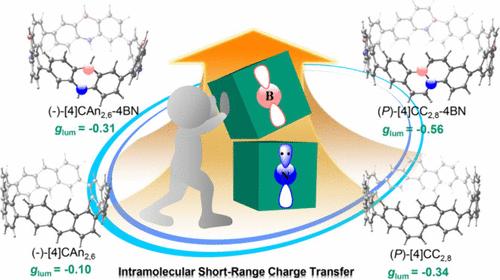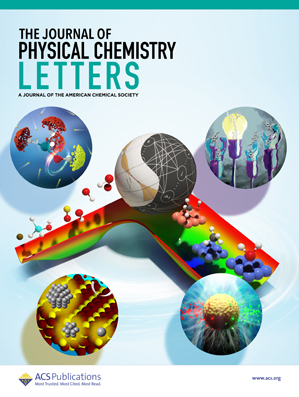通过分子内短程电荷转移将手性圆柱分子的圆极化发光不对称因子提高到 -0.56
IF 4.8
2区 化学
Q2 CHEMISTRY, PHYSICAL
引用次数: 0
摘要
由于高性能圆偏振发光(CPL)材料在圆偏振发光二极管、三维显示和加密领域的广泛应用,近年来受到了广泛关注。但同时实现高发光效率和强发光不对称因子(glum)仍然是一个具有挑战性的目标,需要不断努力。在此,我们对螺旋圆柱分子(-)-[4]环-2,6-蒽[(-)-[4]CA2,6]和(P)-[4]环-2,8-链烯[(P)-[4]CC2,8]的气光性质进行了系统的理论研究,发现独特的对称圆柱结构可以使过渡偶极矩分量沿圆柱表面偏移,而沿垂直中轴集中。这种结构上的优越性促成了电过渡偶极矩矢量和磁过渡偶极矩矢量的共线性,从而产生了巨大的胶体。根据对单个原子过渡偶极矩矢量的分解结果,提出了通过嵌入 B,N 原子引入分子内短程电荷转移来增强胶体的有效策略。由于电过渡偶极矩的减小和磁过渡偶极矩的保持,嵌入 B,N 原子的设计分子 (-)-[4]CA2,6-4BN 和 (P)-[4]CC2,8-4BN 的电荷转移分别达到了 -0.31 和 -0.56。这项分子洞察研究加深了对结构-性能关系的理解,为改善 CPL 材料的光泽度提供了有效的指导。本文章由计算机程序翻译,如有差异,请以英文原文为准。

Enhancing Circularly Polarized Luminescence Dissymmetry Factor of Chiral Cylindrical Molecules to −0.56 through Intramolecular Short-Range Charge Transfer
High-performance circularly polarized luminescent (CPL) materials have received wide attention recently by virtue of broad application in circularly polarized light-emitting diodes, 3D display, and encryption. Reaching both high luminescence efficiency and strong luminescence dissymmetry factor (glum) is still a challenging goal that requires continuous efforts. Herein, we performed a systematic theoretical investigation on the chiroptical properties of helical cylindrical molecules (−)-[4]cyclo-2,6-anthracene [(−)-[4]CA2,6] and (P)-[4]cyclo-2,8-chrysenylene [(P)-[4]CC2,8], and found that the unique and symmetric cylindrical structure could make the transition dipole moment components offset along the cylindrical surface but concentrated along the vertical central axis. This structural superiority contributes the collinear electric and magnetic transition dipole moment vectors and thus the large glum. Based on the results of decomposed transition dipole moment vectors to individual atoms, an effective strategy to enhance the glum through introducing intramolecular short-range charge transfer by embedding B,N atoms is proposed. The decreased electric transition dipole moment and well-kept magnetic transition dipole moment enable the glum of B,N-embedded designed molecules (−)-[4]CA2,6-4BN and (P)-[4]CC2,8-4BN up to −0.31 and −0.56, respectively. This molecular-insight investigation deepens the understanding of the structure–property relationship and provides efficient guidance for improving glum of CPL materials.
求助全文
通过发布文献求助,成功后即可免费获取论文全文。
去求助
来源期刊

The Journal of Physical Chemistry Letters
CHEMISTRY, PHYSICAL-NANOSCIENCE & NANOTECHNOLOGY
CiteScore
9.60
自引率
7.00%
发文量
1519
审稿时长
1.6 months
期刊介绍:
The Journal of Physical Chemistry (JPC) Letters is devoted to reporting new and original experimental and theoretical basic research of interest to physical chemists, biophysical chemists, chemical physicists, physicists, material scientists, and engineers. An important criterion for acceptance is that the paper reports a significant scientific advance and/or physical insight such that rapid publication is essential. Two issues of JPC Letters are published each month.
 求助内容:
求助内容: 应助结果提醒方式:
应助结果提醒方式:


